
I’ve always been sensitive to the judgments and questions around why I may have certain interests that have “no evidence” behind them. My inner snarky teenager could point to religion or other schools of belief that have more mainstream acceptance. A militant Dawkins fan might make the point that numbers of adherents are not proof. (I spent my teenage years in arguments against religion, so such back-and-forths are not pure imagination for me.)
Such a conversation could quickly devolve into contemptuous labeling of all believers as idiots, or the believer might offer up their very personal stories of why they believe.
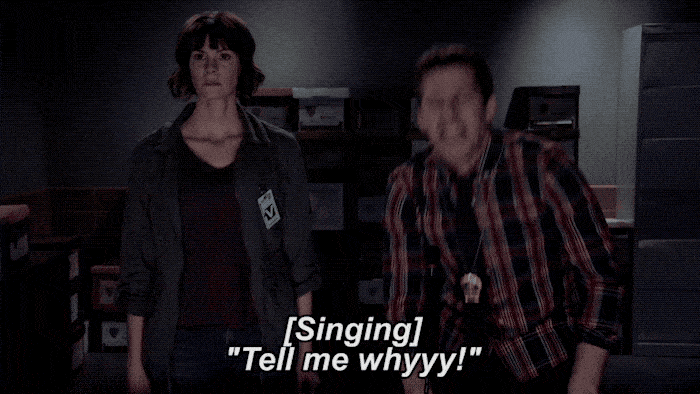
Astrology doesn’t need personal testimonials, though it has many. And what it has is birth data of countless human beings over decades, if not centuries, and the committed kooks who have pored over birth charts and found patterns for the same amount of time.
If the owners of the birth data and charts are open to interview or have their lives in public scrutiny, all the better for testing and refining the way information is drawn from birth charts and ongoing planetary transits. Critics who choose judgment over curiosity often miss this:
Astrology isn’t static.
Astrology has both fixed and dynamic elements, like people. You can’t change your birth time —though your birth time can be misremembered or mis-recorded. But your experience on earth changes with time and place—where you are and when you are. People can sometimes think of places and times in their lives when it seemed everything was going right and anything they touched turned to figurative gold. Good astrology can spot and account for such blessed periods, and the tougher ones too.
But unlike in religion, astrologers can points to charts and agree (or disagree, if using different systems) why your luck is on an uptrend at any time, and what inner drives, themes, and struggles you face. There’s something of a paper trail that comes from the decades and centuries of thousands of people spotting patterns.
This offers relatively more objectivity around how or why someone has smoother or rougher sailing through life at any time, over the arbitrary or unprovable conclusion that God is favoring or punishing you until the random date or hour They’re satisfied.
Astrology can technically calculate that day or hour without invoking an existential crisis. (I don’t get as specific as hour, but for reasons too long to write here). This removes a non-negligible amount of emotional manipulation and moral blame (including self-blame) that can come from going through an extended period of challenge.
Astrologers would simply look for a Saturn or Pluto transit and be like “oh, this will just be 2 years or so. Buckle in.”
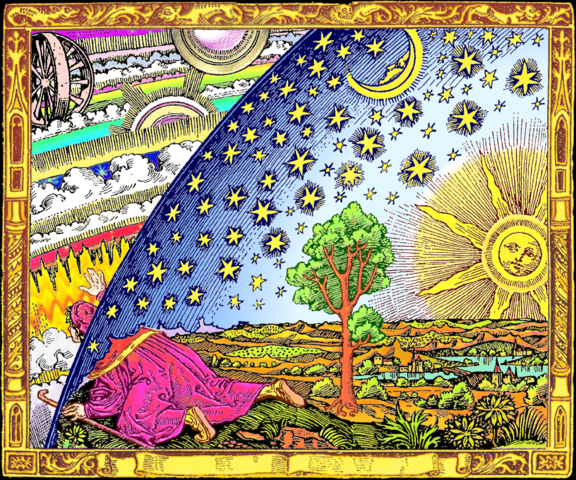
“Oh, it’s just Saturn in Retrograde. Karma bites, man, haha.” The Flammarion engraving (1888) in blazing technicolor. Source
I prefer when astrology sees such periods as good for testing and personal growth, rather than times a diety has taken offence with my birth time (which I can’t change). Or times I have to carry a certain crystal for protection (don’t tell me what to do), or I have to pay for a ritual or spell on my behalf that can mysteriously escalate in price and frequency needed.
Call me stubborn, cheap, or suspicious, but you can blame that on my Saturn in a fixed sign.
Not all astrology systems are equal.
I’ve mentioned elsewhere I don’t adhere to Chinese astrology, for example, though I spent time with it in my 20s and 30s. I had bazi and fengshui books and Chinese almanacs, and I suspect (no, I know) I was insufferable at that time.
But I was also suffering. From hypervigilance and internal dissonance, which Chinese metaphysics easily fed into. There was always something to fear. Maybe a directional facing of the house I forgot to blame, or some table I forgot to look up (maybe I had to learn the flying star system!), to explain why life was tough and a career elusive. (Low self-esteem and shame, as I’ve written about, is to the Chinese as water to fish. I was completely blind as to how my rockbottom confidence and avoidance coping mechanisms were sabotaging me.)
In Psychology parlance, Chinese metaphysics feed into an external locus of control.
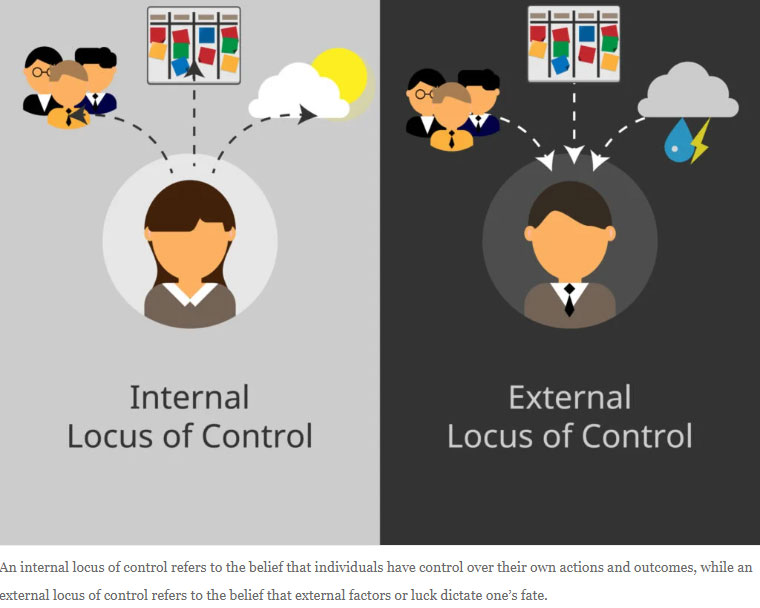
Image and caption source: Simply Psychology
During this time, I channeled energy into stuff like putting 3-legged frogs into room corners (to enhance wealth luck) and resizing all my images in online portfolios into pixel widths ending in “8” or its multiples. OK, that wasn’t all I did, but still, I wonder if Bill Gates or Trump or Rowling ever owned any butt-ugly sculptures of frogs sitting on piles of Chinese coins, like tiny Smaugs with SDE. I bet not.
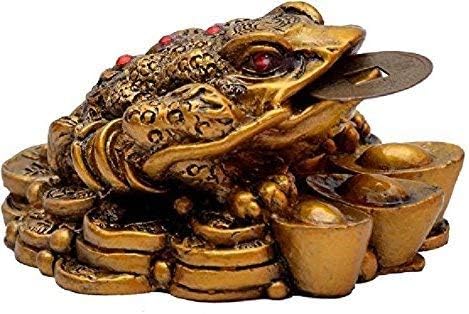
Don’t ask me how to make this fit with your Hygge decor scheme.
I put effort into magical objects and systems instead of going to therapy or reaching out for any professional help. (Rejection Sensitivity Dysphoria and extreme shame around artmaking paralysed me, but I wouldn’t know what CPTSD was for years yet.) And I had extreme lack of guidance and support for what I wanted to be successful in. Tl;dr younger Janet wanted to believe Chinese metaphysics would explain and fix everything wrong in her life.
It didn’t. And Chinese metaphysics and its focus on survival, materialism, luck, and “favor” from the elements/dieties lead me away from recognising my hypervigilance and emotional dysregulation, my lack of emotional safety, literacy, and support, all the symptoms I exhibited of enmeshment, codependence, and narcissistic abuse, and a nervous system so stressed since childhood it had multiple chronic health issues that were yet more signs of moral failure and shame.
It had no eyes for all these heavier and powerful influences in my life when they were the water undertow in which I’d been drowning. (These influences are clear in my Western astrological chart. Meanwhile Chinese astrology doesn’t include Pluto or Chiron.)
So the Chinese system is, to my experience, both blind and disempowering. It is fatalistic, attributing one’s lot in life to tables and and lucky stars and directions that literally change by the hour. It ignores power dynamics, trauma, psychology, education, neurodiversity and gender diversity, socio-economic inequality and access to opportunity. And it is a product of its culture.
I said what I said. The Eastern sciences work on insular syncreticism rather than Socratic questioning or evidence gathering. They do not acknowledge the planets beyond Saturn or the longer cycles and patterns presented by them. There’s little encouragement of inward reflection or analysis of larger systems (much less questioning the wisdom from higher-ups); psychological advice usually goes no deeper than telling people to worry less and grovel more. It clings to traditional systems of harmony based on 5-element theory, elemental weightage tables also based on the theory (eg. Jupiter or stem-branch calendar having a 60-year cycle, instead of 12, because multiply that by 5), and lucky and unlucky numbers based on sound (eg. “4” is taboo because it sounds similar to “death”). It creates longer cycles not based on astronomical observation but multiples of favored numbers (from magic squares, but anyhoo). I may sound mean, but I’m not done:
The focus becomes all about external and behavioral control to maximise your ease and reward for doing everything right.
This reward/punishment binary is condescendingly simplistic, a thought-stopping mechanism directly plugged into an emotional and autonomic shame system that ties success with moral superiority. It exploits trauma triggers and supports authoritarian systems by ignoring widespread systemic abuses and inequalities. It’s all about survival and getting out “unscathed” and being “good” by looking good (no surprise from the culture that gave us face-saving).
The Chinese system has zero language (in words or archetypes or celestial bodies) for trauma. It has no diagrams. It has columns and tables and more tables for luck heading upwards or down. Meanwhile Western astrological charts present 360° wheels, un-obfuscated, almost as unique as fingerprints. Patterns of trauma, relationship habits, quality of upbringing, life focus, coping and power dynamics are laid bare.
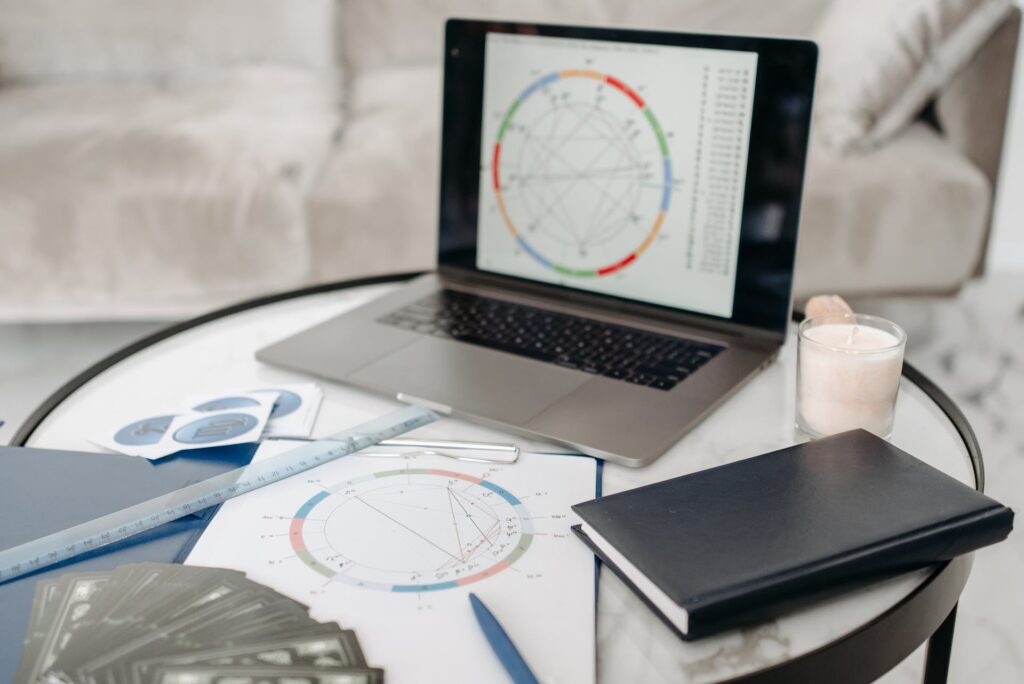
Photo by Pavel Danilyuk: Looking for stock photos related to astrology gave me pics like this one, where I don’t know how the ruler comes in. A protractor might be more useful. I can’t even with the candle.
As a conversation starter or method of self-analysis, Eastern schools of astrology starkly ignore the influence of Adverse Childhood Experiences, toxic environments, and generational trauma on a person’s trajectory. In Chinese culture, I suspect it’s because of the taboo attached with seeing one’s childhood experiences in any negative light.
“Your parents fed and clothed you! They could have left you in the streets!” This guilting line, so common in Asian online discourse and Asian dramas, essentially threatens illegal abandonment of a minor and ignores the power differential between children and adults for emotional manipulation and weaponised gratitude. (Children have emotional, attachment, and developmental needs; and birth control exists for those unready to parent. Also, children are not your therapists or a retirement plan.)
I guess this has gone on a bit long because I had a lot to get off my chest. In short, I don’t trust information from authoritarian, narcissistic, enmeshed, or vertically-oriented cultures. They undermine intellectual curiosity and integrity.
Evolutionary astrology is where the psychologists hang out.
This is not even a joke. Neptune (discovered and named 1846), Pluto (1930), Chiron (1977) and the field of psychology (its first forms appearing in the mid- to late-1800s, Carl Jung’s Psychology of the Unconscious 1917, Carl Roger‘s Client-Centered Therapy 1961) synthesized, within Evolutionary Astrology, Neptune as the planet of dreams and projections, Pluto as the ruler of our subconscious drives (and our relationship with the taboo) and Chiron the wounded healer as the indicator of our heaviest burdens and chronic issues.
I don’t know how else to say this, but in my exploration—and no doubt, same for the psychologists and astrologers who’ve also delved into this—this is where shit. Got. Interesting.
There are now planets, points, houses, archetypes, and language for spiritual bypassing and poor boundaries (Neptune), self-differentiation and separation trauma (Uranus), restrictions and deprivation (Saturn), hidden power dynamics (Pluto), inherited family systems and early childhood experiences (4th house, south node), and all the nuances that come from their placements and interactions.
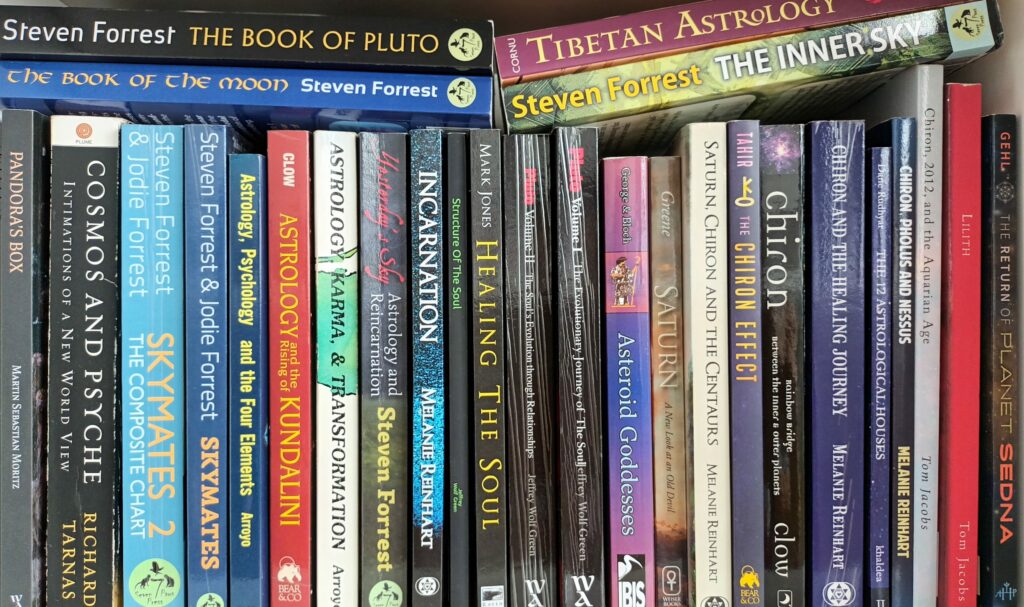
I have more psychology books than astrology now but they’re not as neatly shelved.
In the last 10 years, longer than I’ve actually formally studied Counseling Psychology, Evolutionary Astrology gave me the language and tools with which to understand my own stuff and to describe the emotional and psychological workings and experiences of people. Often, 15 minutes of me laying out a birth chart’s psychological implications could lead to a discussion of long-held beliefs, relationship patterns, and coping or trauma reactions.
Regular psychotherapy typically takes longer or several sessions to get the conversation to this point. Even now, I’m still astounded and get astounded anew with every astrology reading. (Fact is I grew up loving both astronomy and mythology, and I get to appreciate them, plus psychology, in evolutionary astrology.)
Evolutionary Astrology doesn’t treat the birth chart as destiny. It’s more like a map that helps describe your “factory settings” for this life, with the understanding that people can grow and essentially evolve.
The right thing empowers you.
Evolutionary Astrology helped me accept myself. And it helps connect me to a sense of a larger ineffable tapestry in a tangible way, at the same time I can appreciate how on-the-nose certain patterns and predictions can get. But I will only use it for empowerment and growth. I dislike readings—giving or receiving—with opaque metaphysical explanations designed to trigger insecurities and anxieties to sell stuff or extra services. I dislike savior complexes and games of flattery or superiority that lend to unspoken power and obligation dynamics.
I loathe that kind of reader, and I’m not one of these. And though it is not expected of me, I have adhered to counseling ethics even for non-counseling work.
I like learning, discovery, geek-ing, and putting tools into people’s hands. I’ve spent years reading and integrating this stuff so I can apply in its most concise and intuitive form. It’s a Uranus-on-Scorpio-MC (psychological insight), Mercury-in-8th-House-Virgo (deep analysis), and Venus-and-Jupiter-in-6th-House-Cancer (understanding and supporting) thing.
And it is in this spirit I offer astrological work, but only to those who approach specifically for it.
Thanks for reading.
